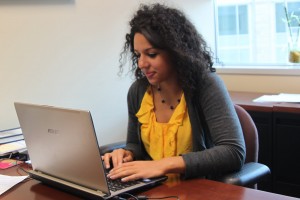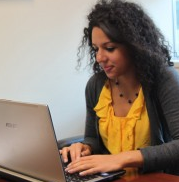After its creation in 2010 and taking first place in the 2011 Fowler Business Challenge, Cognific is set to launch in PrairieCare hospitals in two weeks.
“(There’s) always something new and great, and like 100 things that I have to deal with, but really (my main focus) is seeing the launch of Cognific with smooth sailing,” 2012 St. Thomas alumna Solome Tibebu said.
In August, Tibebu won the student division of the Minnesota Cup with her service-based mental health software Cognific, something she said was a “super experience.” Tibebu received funding for Cognific from the Norris Institute, which helped her hire software developers and designers to bring Cognific to life.
Alec Johnson, an entrepreneurial professor who has helped Tibebu develop Cognific, said Tibebu’s personal connection has with an anxiety disorder gives her an edge in the business.

Tibebu came up with the idea after her own experiences dealing with an anxiety disorder in middle school and high school.
“Investors are always looking for the rally cry, the ‘why,’” Johnson said. “And Solome has a rally cry because she has a personal connection to the problem she solved.”
Johnson said Tibebu has several traits of a great entrepreneur that will take her far, wherever her future may lead her.
“She’s fearless, she’ll ask anyone any questions, she’s not afraid to ask for help, she engages, gets advice, and she’s confident in her business ideas,” Johnson said. “She’s just fearless.”
The service-based software provides mental health exercises in a game format for patients to complete in-between sessions with their therapist. The program also includes a tracking program for therapists to see a patient’s progress.
While managing Cognific, Tibebu is also focused on her non-profit mental health website AnxietyInTeens.org. She is planning a “Girls Overcome Anxiety” weekend for early next year, where middle school girls will be able to sign up and take part in a weekend of confidence building exercises, and will learn more about anxiety while connecting with others battling the same disorder.
“We’re excited to get middle school girls signed up for this event,” Tibebu said. “For the first time, young people will be meeting other people going through the same things, which I think is going to be really unique.”
Tibebu started AnxietyInTeens.org at age 16 when she pulled out a notebook at summer camp and decided to make a website dedicated to dealing with an anxiety disorder.
“I felt like I was the only one going through the things I was dealing with, which is so not the case,” Tibebu said. “So that’s when I said, ‘I’m going to make a website for this.’”
Tibebu said one of the most valuable parts about the website has been the “Hope and Help” section, where those who have battled mental illnesses can send in their personal stories to be posted on the site.
While Tibebu has seen success after her graduation, she said she still has doubts, and starting something new is always scary for her.
“All of this is new … here I’m starting a technology company right out of school, and a lot of it is like ‘oh my gosh I don’t know what to do, I’m freaking out.’ A lot of anxiety, ironically,” Tibebu said.
Tibebu said it is this anxiety that brings her back to her roots in both the companies, and it reminds her of why she started them in the first place.
“If I get to the point of really high anxiety, which happens kind of often, it’s like ‘wow I remember how awful that was, I really need to do this because there are so many people dealing with this,’” Tibebu said.
While Tibebu said she has no idea what the future holds for her, she is excited to see her about the extreme technological advancements made in the last few years and looks forward to taking advantage of them.
“I’m excited about where we are in time, as far as technology advancements, and now the possibilities with that affecting patient engagement and recovery,” Tibebu said. “It’s exciting seeing how that will help other patients with mental illness.”
Gabrielle Martinson can be reached at mart5649@stthomas.edu.



